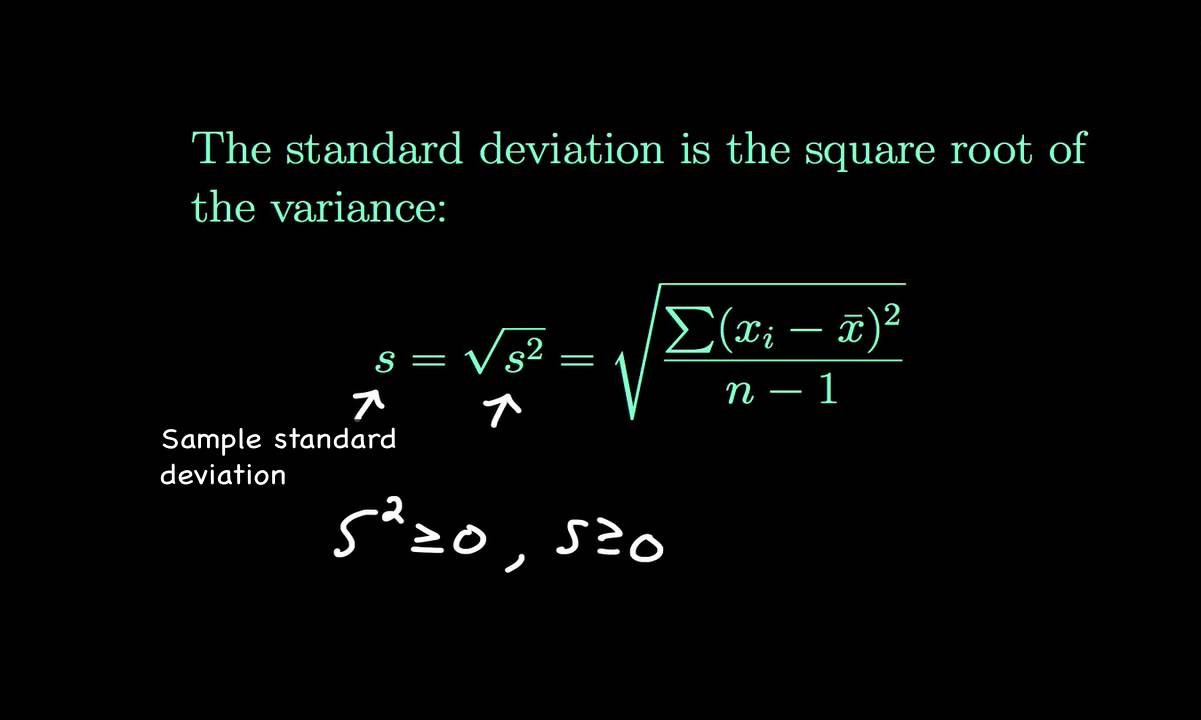undefined
We recommend that you do not leave the page that you are taking this quiz in. Stay honest 🙂
Measures of Variation Quiz Questions Overview
1. What is the range in a data set?
The difference between the highest and lowest values
The average of all values
The middle value when the data is ordered
The most frequently occurring value
2. Which measure of variation is least affected by extreme values?
Range
Variance
Standard Deviation
Interquartile Range
3. What does a high standard deviation indicate about a data set?
The data points are close to the mean
The data points are spread out over a large range of values
The data points are all equal
The data points are all zero
4. How is variance related to standard deviation?
Variance is the square root of standard deviation
Variance is the square of standard deviation
Variance is the same as standard deviation
Variance is half of standard deviation
5. Which measure of variation is used to describe the average distance of each data point from the mean?
Range
Variance
Standard Deviation
Interquartile Range
6. What is the interquartile range (IQR)?
The difference between the highest and lowest values
The range of the middle 50% of the data
The average of all values
The most frequently occurring value
7. Which measure of variation is most appropriate for skewed data?
Range
Standard Deviation
Variance
Interquartile Range
8. What is the formula for calculating the variance of a sample?
Sum of squared deviations from the mean divided by the number of observations
Sum of squared deviations from the mean divided by the number of observations minus one
Sum of deviations from the mean divided by the number of observations
Sum of deviations from the mean divided by the number of observations minus one
9. What does a low variance indicate about a data set?
Data points are close to the mean
Data points are spread out over a large range of values
Data points are all equal
Data points are all zero
10. Which measure of variation is calculated by taking the square root of the variance?
Range
Standard Deviation
Interquartile Range
Mean Absolute Deviation
11. What is the purpose of using measures of variation?
To describe the central tendency of data
To describe the spread or dispersion of data
To identify the mode of data
To identify the median of data
12. Which measure of variation is represented by the difference between the third quartile and the first quartile?
Range
Standard Deviation
Interquartile Range
Variance
13. How is the range of a data set calculated?
By finding the difference between the highest and lowest values
By finding the difference between the mean and median
By finding the sum of all values
By finding the average of all values
14. What does the term ‘standard deviation’ refer to in statistics?
A measure of central tendency
A measure of the spread of data points
A measure of the most frequent value
A measure of the median value
15. Which of the following is NOT a measure of variation?
Range
Mean
Variance
Standard Deviation
16. What is the primary use of the coefficient of variation?
To compare the relative variability of two data sets
To measure the central tendency of data
To find the mode of data
To calculate the range of data
17. What does a high coefficient of variation indicate?
Low relative variability
High relative variability
Data points are close to the mean
Data points are all equal
18. Which measure of variation is used to identify outliers in a data set?
Range
Standard Deviation
Interquartile Range
Variance
We recommend that you do not leave the page that you are taking this quiz in. Stay honest 🙂
Can Your Friends Do Better Than You in This Quiz?
Share this quiz with your friends and compare results.
Was this page helpful?
More Popular Math Quizzes:
-
3D Shapes Quiz
-
Squeeze Theorem Quiz
-
Dyscalculia Quiz
-
Set Theory Quiz
-
Arithmetic Quiz
-
8 Times Table Quiz











